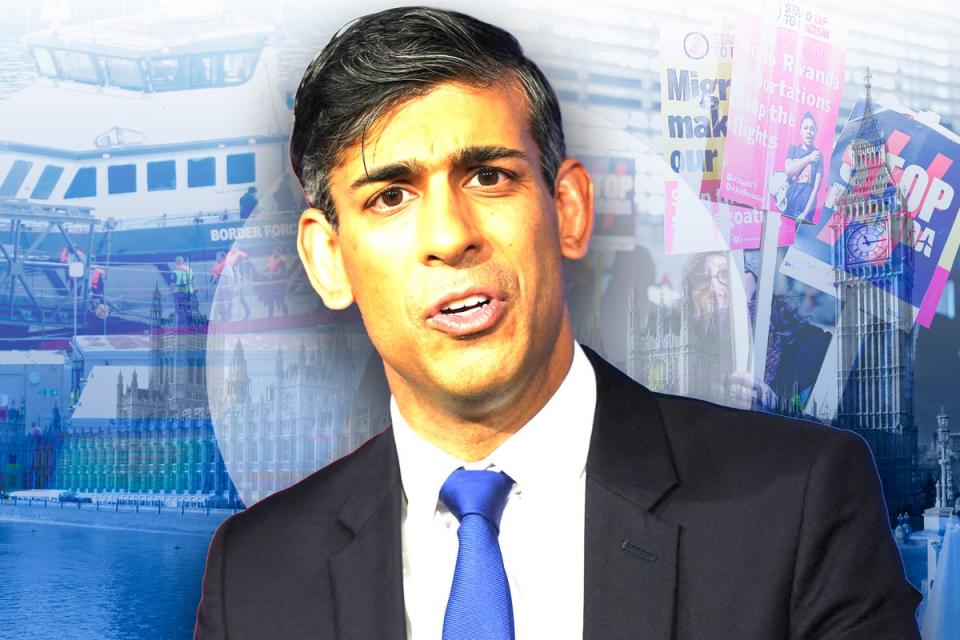Lords vote to exempt heroes who supported UK troops from flights to Rwanda
Peers have voted to exempt Afghan heroes who have supported UK troops from being sent to Rwanda as part of Rishi Sunak’s flagship small boats bill.
The House of Lords backed an amendment on Wednesday night that would prevent the government from removing anyone who supported British armed forces in an “exposed or meaningful manner” from being deported to the African country.
It comes after extensive reporting by The Independent on the plight of Afghan heroes who helped the British but were left behind after the Taliban takeover of Afghanistan.
Two former chiefs of defence staff, a former defence secretary and a former British ambassador to the US were among the Lords who supported the clause. Peers voted 244 to 160 in favour of the amendment tabled by Labour peer Des Browne, which also covers the family members of those who supported British troops.
The Independent has documented a number of cases of asylum seekers who supported the UK armed forces efforts in Afghanistan and who have since been threatened with removal to Rwanda after arriving in the UK via small boat.
Peers inflicted a number of heavy defeats against Mr Sunak’s bill on Wednesday night.
The House of Lords also backed an amendment that would overturn the government’s plan to oust the domestic courts from the process of deporting asylum seekers to Rwanda.
The clause, backed by 278 votes to 189, restores the jurisdiction of the domestic courts in determining the safety of Rwanda and allows them to intervene in certain cases.

Mr Sunak’s government is using the Safety of Rwanda Bill to try and prevent any legal challenges by asylum seekers to their deportation.
The bill also currently gives ministers the power to ignore emergency injunctions from the European Court of Human Rights, aiming at clearing the way to send asylum seekers on flights to Rwanda by spring.
Peers in the House of Lords also voted by 265 to 181 to enable UK courts to consider appeals against age assessment decisions before a person claiming to be an unaccompanied child is removed to Rwanda.
The latest government setbacks to its Rwanda Bill follow five defeats on Monday, setting the stage for an extended tussle between the Commons and Lords during “ping-pong”, where legislation is batted between the two Houses until agreement is reached.
The prime minister had previously warned the Lords against frustrating “the will of the people” by hampering the passage of the bill, which has already been approved by MPs.
Ahead of the next election, Mr Sunak has made “stopping the boats” a key pledge of his leadership.
Speaking against the bill on Wednesday, Labour frontbencher Lord Coaker said: “The courts are there to ensure justice is done and I think justice in this case does require the ability for the law, as it impacts on an individual, to be tested in the courts.
“That strikes me as something which is fundamental to the way rule of law operates.
“Sometimes that’s really inconvenient to governments... but justice is an important part of our democracy.”
Speaking in favour of the amendment to stop the deportation of age-disputed children, Lord Dubs, a former child refugee from Nazi-occupied Czechoslovakia, said: “It’s difficult assessing the age of children, officials can get it wrong, and this modest amendment simply seeks to provide a safeguard against getting it wrong. Yes, the minister can say, ‘If we get it wrong the child can be brought back from Rwanda’. What a terrible thing to subject a child to.
“Asylum-seeking children are among the most vulnerable of all asylum seekers.”

The Bishop of Chelmsford, the Rt Rev Dr Guli Francis-Dehqani, a former child refugee from Iran, said: “Safeguarding is not some burdensome requirement, but a legal and moral imperative.”
She asked: “Would you consent for this course of action for your own child or grandchild? I do not believe there is any one among us who would.”
The government’s own provisions in the Safety of Rwanda Bill would mean a person claiming to be an unaccompanied child is assessed by two Home Office officials and a decision is made based on appearance and demeanour.
If they are judged to be an adult, they will be sent to Rwanda. The unamended bill would allow judicial review if certain conditions are met, but the person claiming to be a child would need to engage with the process from Rwanda.
They would also only be able to challenge the decision based on an error in the law, not on the basis of an error in fact.


